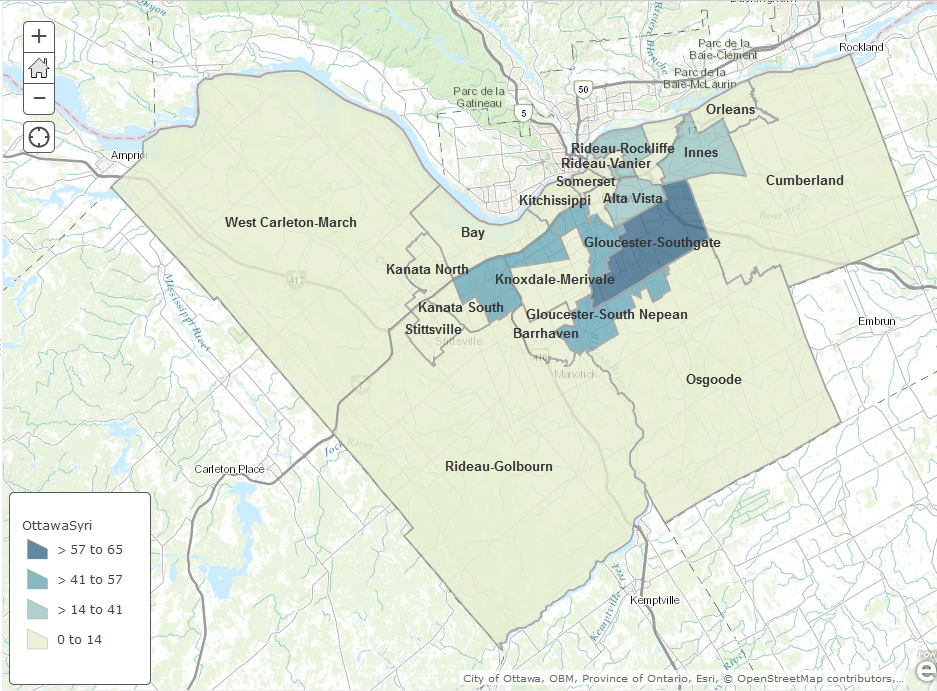Robert Taylor and his team are ready to welcome their Syrian refugee family.
They found a suitable apartment for the family of six, free dental checkups, and even some counselling services if needed.
Taylor is part of the Ottawa South Committee for Refugee Sponsorship, a group of a few dozen citizens rallied together to provide for the newcomers for a year.
They are not alone. Community groups and family members are sponsoring a total of 157 Syrian refugees in Ottawa. Mayor Jim Watson said last month the city will bring in between 800 and 2,000 refugees in total, a staggering addition to the 370 Syrians already living in Ottawa, according to the 2011 National Household Survey.
Number of Syrians per ward

To be eligible to sponsor a refugee family, a sponsor group must be able to provide shelter and assistance for one year, among others. Interpreting services are also recommended, as not all Syrians can speak English and French.
List of responsibilities for refugee sponsors.
Source: Citizenship and Immigration Canada
That’s why Taylor’s group is turning to Arabic-speaking communities to help them welcome the family.
“There isn’t a particularly big Syrian community but there is a large Lebanese community,” he says. “So we’re hoping there may be job opportunities that arise within the Arabic-speaking community.”
Taylor wouldn’t disclose the location of the apartment his committee found out of privacy concerns but he assures there will be linguistic support.
“They will be settled in an area that has a lot of positive Muslim support,” he says.
Laurie Fraser manages the language instruction programs at the Ottawa Community Immigrant Services Organization (OCISO.) Being resettled in an Arabic-speaking neighbourhood is a must for newcomers who may not fully grasp English or French, she says.
“An Arabic-speaking community is important especially in the beginning to feel at home, to build connections (babysitters, advice, help, friendship),” she said in an email.
However, keeping exclusively to an Arabic-speaking neighbourhood isn’t going to benefit them in the long run, she says.
“English or French are needed in order to integrate, work, make Canadian friends,” she says. “You can’t remain in that ex-pat milieu for long or it will become isolating, insulated, even negative (bitter about all kinds of new and difficult things.)”
Most Arabic-speaking households are located in the eastern and southern wards, an analysis of the 2011 National Household Survey shows. The Gloucester-Southgate ward has the highest number of Arabic speakers per capita with 14,726 arabophones per 100,000 people.
Rate of Arabic speakers per ward

Living with neighbours that speak the same language would be an undeniable advantage for the Syrian refugees, says Luisa Veronis, a University of Ottawa professor specializing in immigration.
“It’s not like in the United States where immigrants form ‘ghettos’,” she says. “There will be increased job opportunities and they’ll establish a network faster.”
But staying in those communities might be difficult when the sponsorship program ends after a year because they’re typically living in affordable housing neighbourhoods, she says.
Syrian refugees will not get bumped up the waiting list for affordable housing, said Immigration Minister John McCallum during a news conference Wednesday.
“Canadians want to welcome these people coming from the scourge of civil war to our country, make them feel comfortable,” he said. “But at the same time, we don’t want to put them in a privileged position relative to other Canadians who are themselves working hard to find housing, to become citizens and so on.”
The first planes of refugees are set to arrive in Canada this week. Taylor hopes their family will be in that contingent.
“We’re ready! Well, we won’t know until we see them, but we sure hope so!”
